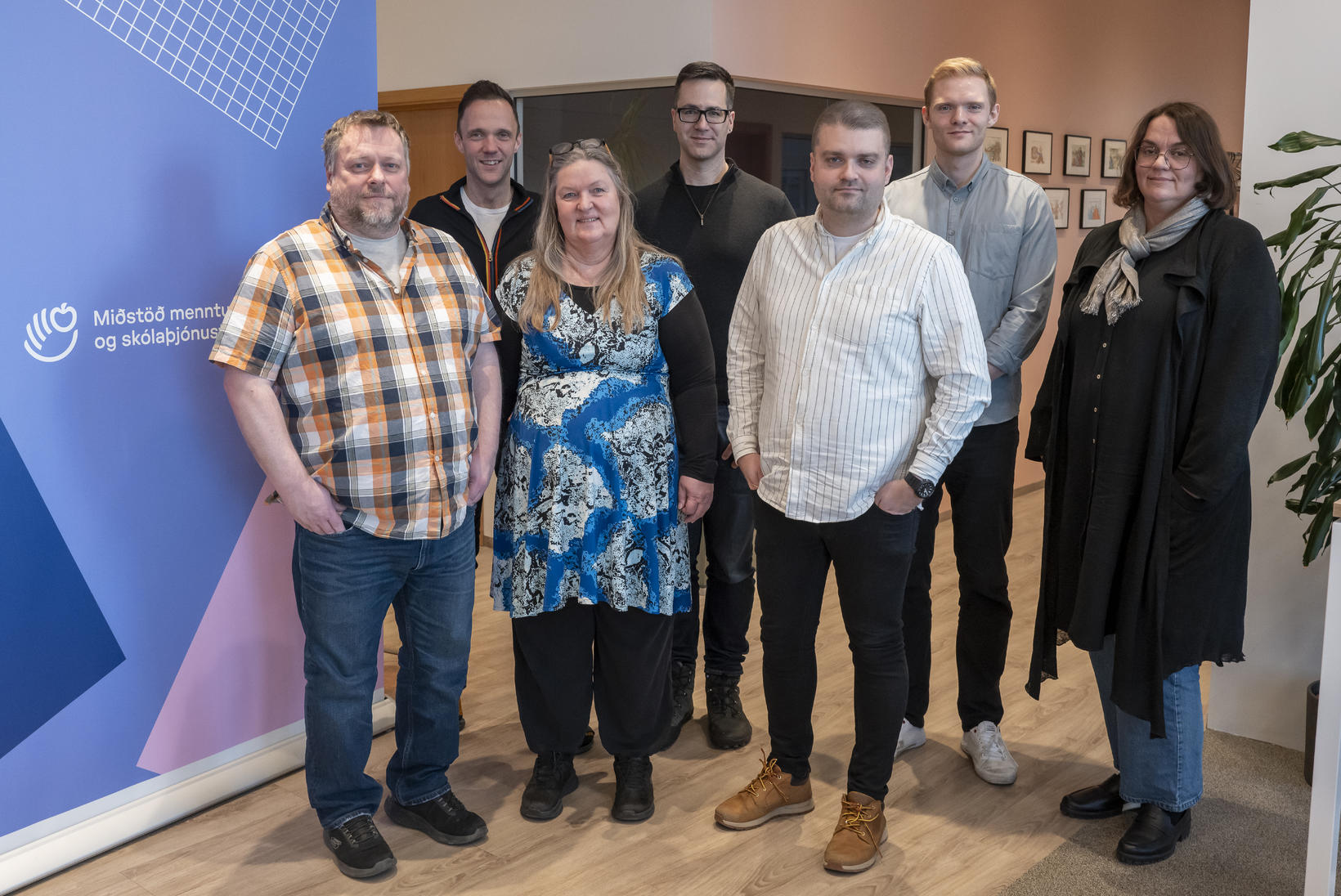Icelandic chatbot to assist teachers
Part of the working group poses for a photo at its first meeting. From left: Ragnar Þór Pétursson, teacher at Norðlingaskóli, Árni Árnason, director of communications and services at MMS, Lára Stefánsdóttir, principal at Tröllaskagi Secondary School, Josh Klein, advisor and group leader, Ásgeir Torfason, digital leader at MMS, Geir Finnsson, English teacher and social affairs officer at MH and Þorbjörg St. Þorsteinsson, project manager at Mixtúra. Photo/ent to mbl.is
The Center for Education and School Services is developing an artificial intelligence tool to assist teachers in various ways.
The tool resembles a kind of chatbot and teachers will be able to ask it all sorts of questions related to teaching, for example how best to organize teaching in line with the National Curriculum.
A special database
The database is based on all the data that the Center for Education has and the goal is to make it accessible to teachers in one area and for them to have a conversation about it with the artificial intelligence.
The prototype is ready and the Center for Education's working group, composed of people from the school community, has been able to get out and ask the chatbot various questions.
Joshua Klein, an expert in artificial intelligence, has consulted with many of the world’s largest companies, and is leading the project.
Björgin assists in creating questions
The tool has been named Björgin. It is therefore intended to assist teachers, among other things, by reducing the organizational burden, providing them with a tool to tailor learning materials to students' needs, providing assistance with creating assignments and questions from learning materials, making real-time translations of teaching materials available, providing suggestions for learning materials and guidance for teachers, and ensuring that teaching materials meet the requirements of the National Curriculum.
As mentioned earlier, the prototype is ready, but a ten-person working group is currently working on testing Björgin and providing feedback to further develop the tool.
Klein says Iceland is in a particularly good position to implement a chatbot like this.
Is the technology only intended for teachers or will it also be useful for parents and students?
“We haven’t decided on that yet. The reason why we are allowing teachers to get to know the program now is, among other things, to make decisions like this and see how we get the most out of this technology. I am not a teacher, so the biggest problem I have to solve is to ensure that the AI will be useful in teaching and be used as best as possible,” Klein says and continues:
“For that to happen, we need to allow those who will use it to try it out, which is why this working group was set up. Later, we will bring in more people who are interested in AI to provide feedback. Then we will continue to bring in even more people to improve the project and make sure that it is useful to as many people as possible.”
Some answers are pure fabrication
When asked why a teacher who is used to using more experienced AI programs, such as ChatGPT, should switch to the recently developed Björgin, Klein mentions, among other things, that chatbots such as ChatGPT do not have access to the MMS database.
“What’s even more important is that ChatGPT has access to all sorts of data on the World Wide Web and is supposed to provide purely fictional answers. Part of the reason we decided to undertake this project is that we wanted to try to prevent the harm that AI can cause, but we also wanted to take advantage of the benefits that AI has.”
ChatGPT’s data is also hosted in California. This can be dangerous when a lot of information from teachers or students is collected there.
“When you ask a question, the data ends there and there are no restrictions on what can be done with that data. It may not be a problem in California, but it is a problem here in Iceland, especially when European regulations around AI are implemented to a greater extent here, we will have to take them into account.”
Less restrictions in the US, and more regulations in Europe
Speaking of privacy, you must have had to take it into account when developing the project?
“Yes, absolutely. This is also a particularly interesting point in time regarding this. The US decided not to apply central control when it comes to the development of AI, so we will probably see the development of AI with a strong emphasis on how to increase profits, there will be more innovation and fewer restrictions. At the same time, the European Union has decided to approach this issue with a greater emphasis on regulations and central control. Iceland falls somewhere in between. “This is a small and nimble country,” Klein says, adding:
“We know that teachers are using technology like ChatGPT and other AI tools that are available. The question we’ve been trying to answer is: How can we engage them in a way that tries to avoid the harm that AI can do, while at the same time giving them tools that they are allowed to use and that will benefit them.”




/frimg/1/57/93/1579337.jpg)


/frimg/1/57/94/1579405.jpg)
